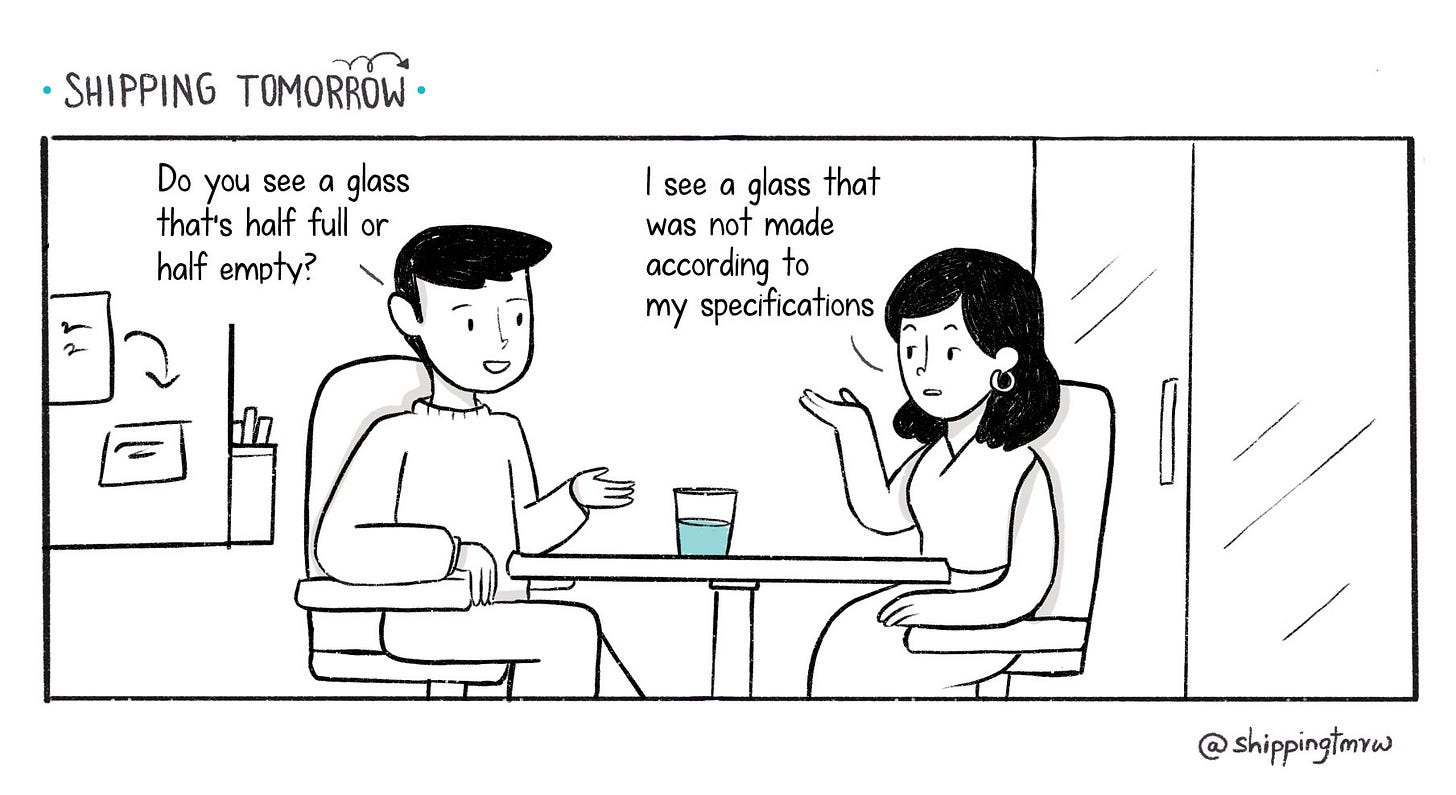Photo by Mimi Thian on Unsplash
If you’ve been our reader for a while, you know that we’ve written quite a bit about what to do in a PM interview. We’ve talked about how to answer a tough technical problem, or how to spin a story during a behavioural question.
Over the last couple of months, my workplace was on a hiring spree and I had to interview a ton of candidates for a PM vacancy on my team. During these interviews, I realized that people make some very basic and avoidable mistakes. And it creates a pretty bad impression, sometimes right from the start of the interview.
Some of these mistakes might sound like obvious no-brainers, but the truth is that a lot of people do need help with the way they present themselves. The good news is that it’s pretty easy to dodge these bullets with a few minutes of preparation. The first step is to be aware of whether you’re falling into these bad habits.
Here are a few things that you should never do in a PM interview.
Don’t go into too much detail when you’re introducing yourself
“Tell me a bit about yourself and your previous experience”
This is a standard question at the start of most interviews. The expectation here is to understand the breadth of experience you’ve had, and what kind of questions interviewers can ask to understand more about you.
Sometimes I find that candidates drone on and on, going into detail about a feature they’ve worked on, how they validated the problem and the challenges they faced when working with other teams.
This is a terrible way to start the interview.
The interviewer is not prepared to digest all that information yet. Each interviewer has their own mental model of understanding your past, and you need to give them the space to ask questions so that they can form a clear picture of your skills and expertise. Overloading them with information right at the beginning is only going to backfire.
The ideal answer is to give them an overview, and dole out the details in bits and pieces as the interviewer asks for them.
Don’t do this:
“My name is X and I'm currently working at ABC. I mostly work on the reporting and analytics features. It had 3 modules, and I spoke to 15 customers to understand their requirements. One of the customers said that they wanted to have customized filters. So I worked with the UX research team to understand if this is a common ask. I also looked at the data in Google Analytics and I saw that page views and clicks are very high on the analytics page and that the drop off rate at filters is very high. So I created some Figma files and talked to the engineering team about the new feature. They said that this is a complex feature and it would take at least one quarter to build. So I had to convince them—”
Do this:
“My name is X and I currently work at ABC. I have two years of experience in product management, and before that, I was a consultant.
During my PM stint, I have mostly worked on reporting and analytics, which is quite challenging. My role mostly involved interacting with customers to understand pain points, working with UX teams to validate these pain points, creating the requirement documents and helping engineering build it into a full-fledged feature. I also work a bit with marketing teams during the launch of a feature. I’d be happy to go more into detail about any of these.
On a more personal note, I am a very active person and usually spend my weekends hiking or playing table tennis.
Once you have given your interviewer this brief, their curiosity will be piqued and they will probe further on a certain part of your answer. At this point, the interviewer actually wants the details and a longer explanation will be well received.
Another thing that works well is to mention an interesting problem that you worked on, and leave hooks in your answer that will nudge the interviewer to probe further. Once they are invested, it is finally time to wow them with your story.
Never assume that people are familiar with your product
A lot of PMs work on complex features. You may work on a marketing automation product, but no two marketing automation systems are the same. Each has its own USP and complexities, and your job is to know exactly what your product stands for.
Nobody else is expected to know this. This means it’s also your job to dumb it down for the interviewer.
Often I find candidates start talking about a new feature that they worked on, without taking the time to explain the basic product first. When this happens, I am usually struggling to understand why the new feature is being built and what value it provides. It might seem obvious to the candidate because they are an expert. But it creates a situation in which I am not easily following the conversation.
The golden rule is: Always give an overview of the product before you go into detail.
If you would like these articles in your inbox subscribe :)
Don’t make up a fake reason about why you want to join the company
Another common question is “Why do you want to join this company?”. Usually, the interviewer asks this question to find out what you’re looking for in your next job, and maybe what kind of work environment you’re looking for.
Sometimes candidates make up fake answers like “This sounds like a very unique product and you’re doing something new and I want to be a part of that.”
Don’t do that.
If you’ve done research about the company and you have solid facts that actually appeal to you, then go ahead and talk about it. If you’ve done your due diligence and you know that it’s a company with only 20 employees, you can say that you’re looking to work in a chaotic startup environment.
But most of us don’t have the time and bandwidth to do that kind of research, especially before the first screening call. I don’t read up about a company when I apply—not unless it’s a dream company. I usually go on a button-clicking-spree on LinkedIn where I hit “Apply” for about 50 companies in a day and wait for the responses to come in. A lot of people do that.
And it’s perfectly alright to be straightforward and just say “To be honest, I was looking for a change and came across this job posting on LinkedIn. I am pretty open to new opportunities at the moment, and the work you’re doing definitely has a lot of scope for learning something new.”
And then you can add a line about what you're looking for at your next job, and that will tell the interviewer a lot about you.
Avoid overusing the information you know about the interviewer
The day before the interview, I always stalk my interviewer on LinkedIn. If you don’t already do this, I highly recommend it. Sometimes you find good ice breakers that can set the tone of your interview early on.
For example, I once found out that my interviewer was an alumnus of my college. I started my personal introduction with this fact, and it served as a fun ice breaker. (Spoiler alert: That was the final interview and I got the job!)
But sometimes people tend to overuse this information. There was once a candidate who kept name-dropping my alma mater and my previous workplace. He started every answer with “Since you worked at Freshworks, I’m sure you understand that—” or “Being from IIM I am sure you have experienced—”
Half the time it wasn’t even relevant! It just came across as scripted and unauthentic.
Do not waste the opportunity to ask questions at the end of the interview
Every interview ends with a small window where you get to ask the interviewer about the company or the role. Sometimes, I hear people say they don’t have any questions.
This never fails to surprise me. Doesn’t everybody have a million things to consider before they join a new company?
It might be a good idea to prepare your questions ahead of time. For starters, it will help you make a decision about whether this company is really the right fit for you. Secondly, it gives the interviewer an idea about what you’re looking for.
When a candidate has no questions for the interviewer, it signals a lack of interest. After spending a whole hour creating a good impression, don’t erase your hard work by acting uninterested. At the very least, you should ask about the team size and structure, the feature you will be working on if the interview goes well. If it’s a startup, feel free to ask about funding and plans for growth—this shows real interest and intention to take the job seriously.
Final thought
Some of these mistakes happen purely because of the nervousness of the situation. It’s a high stakes event, and the result could determine the next few years of your career. A little preparation before the interview can go a long way and help you avoid these behaviours.
We tend to prepare for technical questions, but never for the “easy” parts like introducing ourselves. Moreover, even the easiest questions make us falter if we’re rusty and sitting for an interview after many years.
I would recommend that you practise introducing yourself 5 minutes before each interview. I do that, and it helps. It keeps the words fresh in my mind. Sometimes I write down keywords in a notebook if I’m feeling extra anxious.
If possible, you could even do mock interviews with your friends. You could include people from unrelated fields to see if you’re keeping it simple without getting too technical.
A little preparation can snowball into a great first impression and eventually your interview will become a huge success!
If you’ve come across other interview mistakes, let us know and we’ll write another post about how to avoid or handle such situations!





